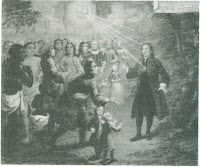 A few years ago when I was at uni, the EU was using Easter as an opportunity to witness to the university. We gave out hot cross buns, books about Jesus, and had lots of good conversations. But the center-piece of this event was a large banner, which in giant letters stated ‘We believe in the resurrection of Jesus Christ.’ The banner also bore the names of hundreds of students and lecturers who agreed with the statement and wanted to proclaim it to a doubting and skeptical university. We were declaring the Christian gospel –Jesus Christ is Lord and God has raised him from the dead (Romans 10.9). As the Evangelical Union, the gospel union, we were committed to declaring the same gospel that the Apostles had declared thousands of years earlier. It is from their eyewitness accounts that we believed in the resurrection of Jesus Christ.
A few years ago when I was at uni, the EU was using Easter as an opportunity to witness to the university. We gave out hot cross buns, books about Jesus, and had lots of good conversations. But the center-piece of this event was a large banner, which in giant letters stated ‘We believe in the resurrection of Jesus Christ.’ The banner also bore the names of hundreds of students and lecturers who agreed with the statement and wanted to proclaim it to a doubting and skeptical university. We were declaring the Christian gospel –Jesus Christ is Lord and God has raised him from the dead (Romans 10.9). As the Evangelical Union, the gospel union, we were committed to declaring the same gospel that the Apostles had declared thousands of years earlier. It is from their eyewitness accounts that we believed in the resurrection of Jesus Christ. The very shape of Christianity is determined by the events that first Easter – a fact that the Apostles were acutely aware of. For the Apostles, the resurrection was the core foundation of their gospel: “For I delivered to you as of first importance what I also received: that Christ died for our sins in accordance with the Scriptures, that he was buried, that he was raised on the third day in accordance with the Scriptures…” (1 Corinthians 15.3-4). In his resurrection, Jesus is designated as the Son of God, the King of Israel and true heir of David (Romans 1.3-4, also 2 Timothy 2.8), and is marked out as the one who will judge the world: “…Now God commands all people everywhere to repent, because he has fixed a day on which he will judge the world in righteousness by a man whom he has appointed; and of this he has given assurance to all by raising him from the dead” (Acts 17.30-31, also 10.39-43). As the one who is to judge, the apostles believed that Jesus was not just the King of Israel, but the Lord of all creation and to him belongs obedience from all nations (Romans 1.5, 15.12).
As the King that Israel had long waited for, the apostles knew that Jesus’ resurrection was significant for understanding the purposes of God. When Paul states that the gospel was “promised beforehand through his prophets in the holy Scriptures”, he doesn’t have a couple of proof-texts in the back of his mind. The gospel – the death and resurrection of Jesus – is the climax of God’s covenant with Israel. In raising Jesus from the dead, God has shown himself faithful to his promises to Abraham and David, and has ultimately triumphed over sin and death – the evil powers that have held the world captive since Genesis 3. Jesus is the Christ promised by God to Israel in scripture. His death and resurrection reveal God’s plan for Israel and the world.
For the Apostles, this meant two things. Firstly, forgiveness of sins was now possible for both Jews and Gentiles through Jesus (Acts 13.37-38, 5.31). All people every where must now repent and follow the true king. Secondly, the resurrection of the dead, which Israel didn’t expect until the last judgment, had already happened to Jesus. The newly risen Lord now reigns over creation and guarantees us a resurrection like his when he returns (1 Corinthians 15:20ff). This was the gospel the apostles proclaimed – Jesus is Lord and he offers forgiveness for all and a living hope of a future resurrection.
Our challenge today is to continue announcing the resurrection of Jesus and allowing it to shape our lives. Despite living amongst many competing world views including post modernity and materialism, the resurrection of Jesus, God’s King, shows these up as idolatry by announcing the reality of Jesus’ Lordship. Like the apostles, evangelicals today must keep the resurrection central in our understanding and proclamation of the gospel.
 A common complaint of Christian mission is that it has often been a compliant agent of European imperialism. Although there is some truth in that at times, it is by no means a defining characterization of Christian mission. According to David Bebbington argues that the overriding result of global Christian missions was not the growth of empire but the implanting of Christian faith in fresh lands, often not through the missionaries themselves but local indigenous Christians. He argues:
A common complaint of Christian mission is that it has often been a compliant agent of European imperialism. Although there is some truth in that at times, it is by no means a defining characterization of Christian mission. According to David Bebbington argues that the overriding result of global Christian missions was not the growth of empire but the implanting of Christian faith in fresh lands, often not through the missionaries themselves but local indigenous Christians. He argues:








